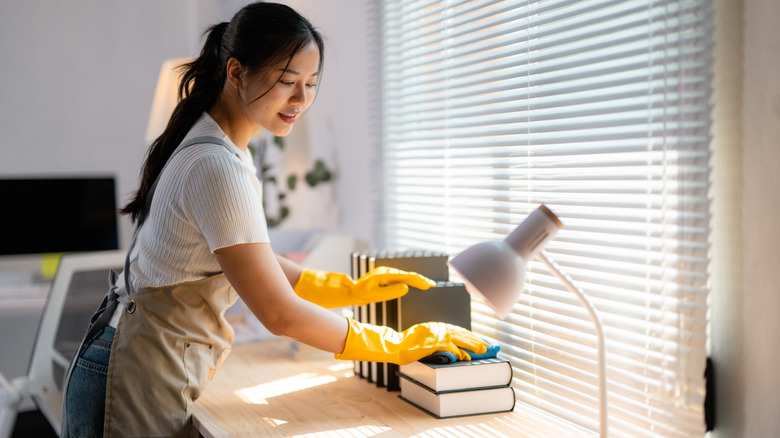Why Decluttering Is So Stressful (And How To Get Through It)
It is easy to adopt the clutter-free, CleanTok trend and slip down the rabbit hole so deep that all you're doing is looking for items you can toss to declutter your living room and every other space. But soon enough, cleaning up and organizing your space, which should make you feel more energized and productive, ends up being a massive harbinger of continuous stress. All you see is clutter and the problems associated with it. Most of the time, it is the pressure of keeping up with trends and being seen as a "bad person" if you fail that creates the stress. The best way to manage this is to detach yourself from the clutter, find your true reason for clearing the mess, and treat the activity as a fun way of life rather than a one-time magic hack to an elevated identity.
For many people, the decluttering obsession began with the popular KonMari method, created by Japanese organizing consultant Marie Kondo. She hammered home the significance of only keeping those things around you that "spark joy" while discarding the rest. However, the method itself is often accused of dishing out bad advice in tidying up. And, the tsunami of organization that followed the method has caused more stress than the initial clutter it was supposed to clear. In an effort to live up to the reputation of living in clutter-free, hyper-cleaned homes, a lot of people are succumbing to mental, emotional, and physical stress.
Major reasons behind the stress of decluttering
One of the main reasons behind the stress of decluttering is the decision-making attached with the clutter. Most items creating clutter are things that you postponed organizing until later, since you were not sure what to do with it at the moment. Couple that with the fact that around 40% of the homeowners in the country are scared to confront the task of decluttering, per the New York Post, and the rationale behind the stress becomes obvious.
Another major reason why decluttering often causes stress is because of the sentimental value attached to the items. Modern minimalistic trends demand that you keep throwing away items you don't need anymore. However, letting things go is not that easy. In fact, it can be incredibly hard, since those things are often linked to your identity and sense of security. Multiply this conundrum by all the items you own, and now you have a recipe for an anxiety attack.
The time, effort, and decisions that come with a day of decluttering can be obviously overwhelming. However, decluttering is never a one-time job. That means there is always the thought of a stressful Saturday of cleaning up the clutter lingering in your head. Ultimately, the pressure of constantly tidying up, organizing, and throwing away items creates a cognitive overload that leads to frustration and feelings of inadequacy.
How to declutter the right way
Before you grab your cleaning gloves or frantically begin searching for decluttering strategies for your home at the first sign of chaos, it is a good idea to ask yourself why you want to declutter in the first place. Although having a clean, organized space is beneficial in many ways, people do it for different reasons. For some, it offers a sense of control in an otherwise chaotic world, while for others, it is a gateway to better focus and more productivity. However, once you are aligned with your true reason, and not simply keeping up with a trend, you will begin to have a lot more control. Moreover, it is also crucial to go easy on yourself, and, unless you have a magic wand, lower expectations on how much time it should take to completely declutter your home. Look at decluttering more as an ongoing lifestyle than as an overnight process that can magically clear all clutter from your life and your home.
Furthermore, it is also important to understand that all that clutter in your house does not define you as a bad person. In fact, for all the bad rep that clutter gets, some level of clutter has also been shown to spark creativity, especially during the brainstorming stage. Bumping against an unexpected item in your closet can trigger a train of thought that ends up being the solution to a problem you had been struggling with for months. Therefore, as important it is easy to keep things neat, keeping a little clutter could ensure that you are not sweeping out some really solid ideas with too much unnecessary decluttering.


